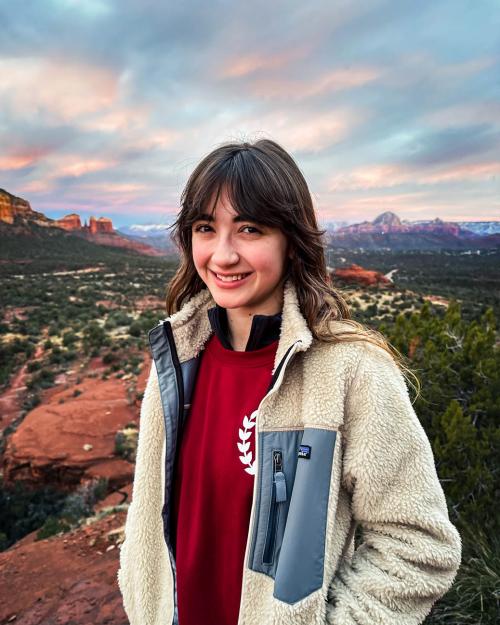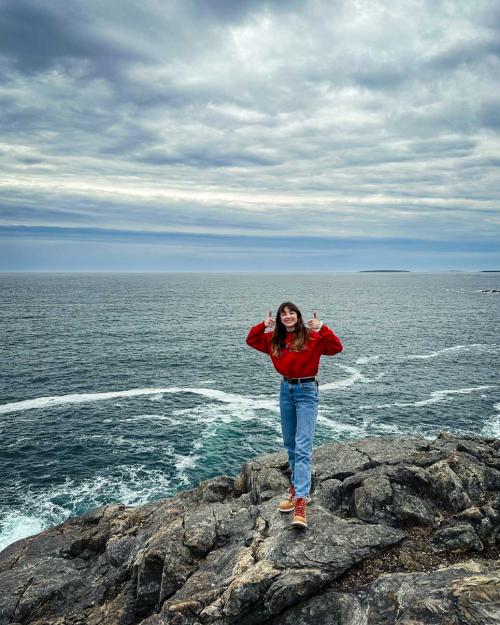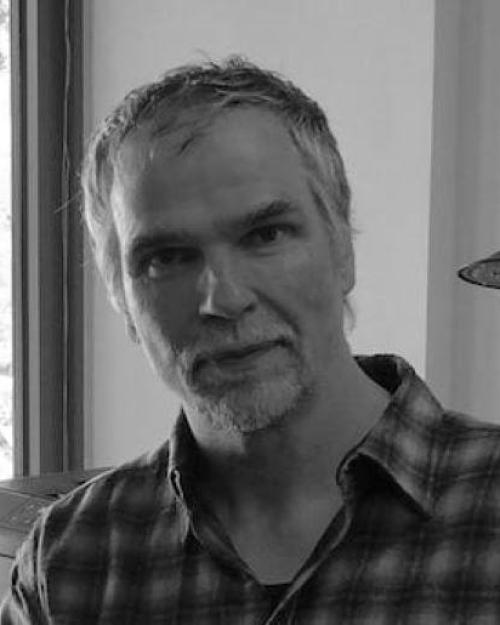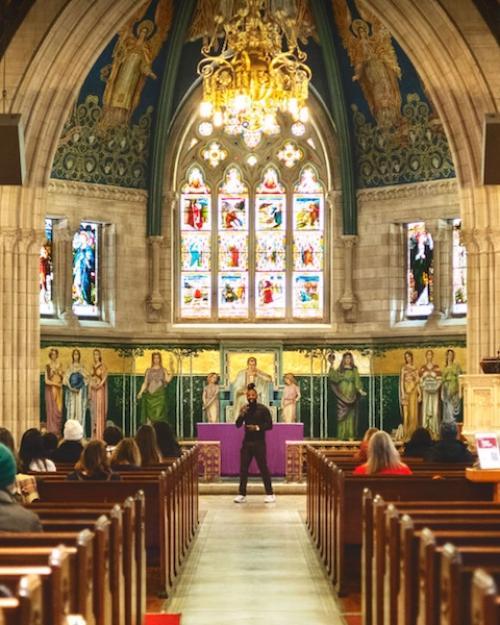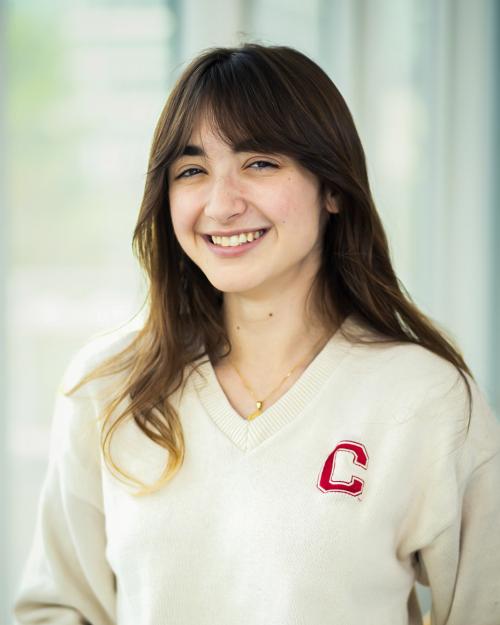Jacqueline Allen
Psychology, Philosophy & Government
Telluride, Colo.
What is your main extracurricular activity and why is it important to you?
My main extracurricular activity is Logos: The Cornell Undergraduate Philosophy Club and Journal. I've been involved with Logos since transferring to Cornell, and I've been on Logos
leadership since my first year in the club. This organization has been important to me for several reasons. First, I love philosophy, and I love the process of asking questions, exploring theories, using logical reasoning and thinking about why things are the way they are. However, while reading books and taking courses is essential for an education in philosophy, my favorite parts of philosophy are engaging with others, discussing ideas and hearing new thoughts and perspectives. At its best, philosophy is a collaborative endeavor, and Logos has provided a place for me to explore and discuss big questions with other students.
Second, through my leadership positions, I've had the opportunity to welcome others into this field. It can be very daunting to speak up and share one’s own thoughts, especially when first getting started with philosophy. I think this field is sometimes viewed as a pretentious discipline with useless and overly-abstract subject matter, but the reality is that philosophy provides invaluable skills in writing, communication, critical thinking, and logical reasoning. Moreover, philosophy can sharpen our understanding of who we are and why we behave the way we do. Also, philosophy can be fun! Sometimes it is absurd, but that’s okay, because it can be entertaining to critique ridiculous theories with other people. There’s so much to explore with philosophy, and I care a lot about breaking down barriers to this discipline. Through my positions as president and vice president, I’ve worked to promote a supportive and welcoming environment for people from all backgrounds to engage with philosophical ideas.
What Cornell memory do you treasure the most?
As my time at Cornell draws to a close, I find myself thinking about a sunset at the beginning of my sophomore fall, right after I transferred to Cornell. I had just arrived to Ithaca, and after the isolation of the spring and summer of 2020, I was motivated and excited to meet new people during orientation. I spent the day exploring campus with a group of other new transfers, and we all ate dinner together in a giant, socially-distanced circle on the slope. After dinner, we watched the sunset from the top of the slope, and I remember being enchanted by how beautiful everything looked. Even though I had been in Ithaca for less than a week and the semester hadn't started yet, I was overcome by a strong feeling that I was entering a wonderful new chapter in my life. I felt like I had made the right decision by coming to Cornell, and I was excited to see what the upcoming years would bring.
Now, as I prepare to close this chapter and move to the next one, I sometimes look back on that sunset and think about how far I’ve come. Transferring to Cornell was absolutely the right decision for me, and I’ll always be grateful for the education and opportunities I received and the people I met. The past few years have been far from easy, but the challenges I’ve faced at Cornell have promoted my growth, development and success.
What are the most valuable skills you gained from your Arts & Sciences education?
My journey across humanities, social sciences and life sciences has equipped me with a variety
of valuable skills. Through philosophy, I’ve learned how to evaluate reasoning, make logical arguments, engage with complex ideas and share my thoughts through writing and verbal communication. Through government, I’ve sharpened my ability to communicate ideas to various audiences, think critically about different sources and perspectives and identify the influence of politics on science. Through psychology and neuroscience, I’ve gained experience with integrating information across different levels of investigation, approaching questions scientifically and considering the reasons for the thoughts and behavior of myself and others. I think my foundation in humanities has made made me a better scientist, and I think my work in science has enhanced my philosophical perspectives.
What have you accomplished as a Cornell student that you are most proud of, either inside the classroom or otherwise?
I am most proud of my research experience. When I first became involved with research in Professor Laura Niemi's lab, I conducted a study investigating the relationship between self-awareness and moral behavior, and I presented the results at the 2022 Cornell Undergraduate Psychology Conference. Through this experience of leading a research project from literature review to poster presentation, I discovered my enthusiasm for scientific research. I soon became curious about the neural mechanisms underlying the behavior I observed, and I joined Professor Vivian Zayas' lab to explore neuroimaging methods. In this lab, I've run EEG studies examining our feelings toward ourselves and close others, and I've helped prepare for an fMRI study extending the results of the EEG work. Over the past year, I have also been an undergraduate lab manager for this lab, which has involved training new research assistants in EEG methods, delegating responsibilities and overseeing a team of student researchers. As I learned about neural mechanisms underlying cognition and emotion in Professor Zayas' lab, I grew curious about the biological mechanisms underlying these neural processes. I joined Professor Katie Tschida's lab, which investigates the neural circuitry underlying vocalization in mice. I worked in her lab over the summer through the Nexus Scholars Program, during which time I gained experience with various methods in neurobiology. The opportunity to conduct full-time research and learn more about neuroscience methods confirmed my interest in pursuing a future related to neuroscience research. This year, I've been working on an honors thesis with Professor Tschida studying the effects of social isolation on social behavior in female mice. The experience of working independently and leading a research project has been exciting and has provided invaluable preparation for my next steps in graduate school. In sum, research has enriched my education, providing me with a better understanding of my interests and passions.
What are your plans for next year?
Next year, I'll be starting a neuroscience Ph.D. at Northwestern University. My primary interests are neurodegenerative diseases and mood disorders, and I hope to research strategies for treating neurodegenerative dementias and identifying key factors that promote healthy aging.

